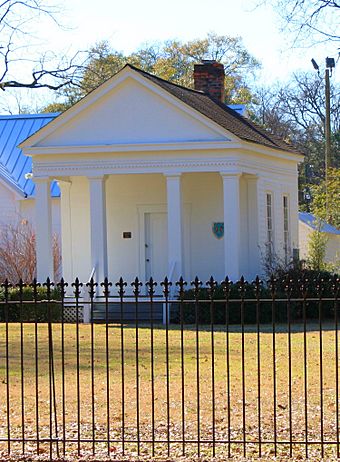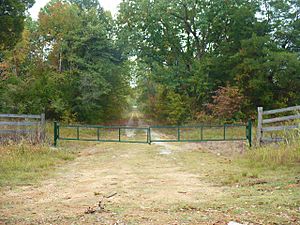Roseland Plantation facts for kids
Quick facts for kids |
|
|
Roseland Plantation
|
|

The Roseland Apothecary Office, now at Sturdivant Hall
|
|
| Nearest city | Faunsdale, Alabama |
|---|---|
| Built | 1835, mid-1850s |
| Architectural style | Greek Revival |
| MPS | Plantation Houses of the Alabama Canebrake and Their Associated Outbuildings Multiple Property Submission |
| NRHP reference No. | 93001476 |
| Added to NRHP | January 20, 1994 |
Roseland Plantation is a historic site located in Faunsdale, Alabama. It was once a large farm with many buildings. The site sits on a small hill at the end of a long driveway. Roseland Plantation was added to the National Register of Historic Places on January 20, 1994. This means it is a special place recognized for its history.
Contents
Exploring Roseland Plantation's Buildings
This section will tell you about the main house and other important buildings at Roseland Plantation.
The Main House's Design
The main house at Roseland Plantation started as a dogtrot house in 1835. A dogtrot house has two parts separated by an open hallway, like a breezeway. This hallway was open to the outside. In the mid-1850s, a big two-story addition was built onto the front. This new part was in the Greek Revival style, which looks like ancient Greek temples.
When the new part was added, the old front porch of the dogtrot house became a hallway inside. The open breezeway was made longer, turning into a very long center hallway. You could get to the upstairs from this central hallway using a special staircase.
What Remains Today
Sadly, the main house and most of the other buildings at Roseland Plantation have fallen apart over time. But the site is still very important for archaeologists. They can learn a lot about the past by studying the ground and what's left.
Two original buildings are still there: a dairy cooler and the old log kitchen. In 1993, before the site was added to the National Register, a survey was done. It showed that only a few walls of the main house were left standing.
Buildings Moved for Preservation
Some smaller buildings from Roseland Plantation were moved to keep them safe.
- The Apothecary Office: This small office was built in the Greek Revival style. It was used for giving out medicine to the people who lived and worked on the plantation. It was moved to the grounds of Sturdivant Hall in Selma. This move helped make sure it would be preserved.
- The Privy: A large, seven-seat privy (an outdoor toilet) from the 1850s was also at Roseland. It was given to the Sturdivant Museum Association in 1979. It was finally moved to Sturdivant Hall in 2005.
 | Stephanie Wilson |
 | Charles Bolden |
 | Ronald McNair |
 | Frederick D. Gregory |




